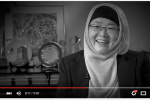Yasmin Alibhai-Brown is Muslim. In her articles she often likes to tell you this in the first sentence to give herself an air of authenticity. Therefore, when her articles are mere fodder for the further stereotyping and othering of Muslims, it is not because she is lazily feeding the expectations of her non-Muslim readers, but because her words are the truth? After all, she is Muslim, so how can she be wrong?
Since the media pathologizes Muslims on a daily basis, who is Alibhai-Brown to go against that trend? Her articles are often about what is wrong with Muslims today–the answer to which is usually not being enough like Alibhai-Brown.
In her piece for the London Evening Standard, the reader does not even escape the second paragraph without being told of “Muslim minds and lives worldwide being closed down by fanatics.” Already the tone is set: Muslim are bad and dangerous, except for our intrepid writer, who presumably, is not a fanatic.
Yet, the first paragraph is a hopeful one, as Alibhai-Brown is keen to met Allegra Mostyn-Owen, who runs art classes at East London mosque. Will Mostyn-Owen be a cause for optimism, or will she fail to be enough like Alibhai-Brown?
Well, the reader does not get to find out any more about Mostyn-Owen’s art skills, as Alibhai-Brown is far too interested in the men in Mostyn-Owen’s life to ask. You see, Mostyn-Owen has “married a man much younger than herself” and would be happy for her husband to marry another, younger wife if he wishes to have children. Alibhai-Brown claims to wish her well, but spends the rest of the article claiming that such actions betray Muslim women.
The reader is not sure what Mostyn-Owen’s response to this would be, as the only time she is directly quoted in the article is when giving a brief description of her husband. This does not stop Alibhai-Brown from indulging in some very patronizing speculation about exactly why Mostyn-Owen has chosen this marriage:
First she has married a much younger, fit man and maybe feels excessively grateful. Then she is going for complete surrender, an uncritical acceptance of the most regressive practices of some of my co-religionists.
Coupled with meeting three unnamed converts who felt “cleansed” and less objectified after conversion, Alibhai-Brown decides that it is “submissive” white convert women who are “dragging the faith back to the dark ages” by choosing to enter polygamous marriages. Alibhai-Brown claims that their actions are not even sincere, just a reaction against the West. Why white converts (Alibhai-Brown only mentions white converts, presumably she hasn’t met any of the large numbers of converts of color) are so dangerous is not justified by Alibhai-Brown. She provides no actual evidence beyond meager anecdotes.
From a statistical point of view, there are 1,591,000 Muslims in the U.K. Only approximately 14,000 of these are converts, that’s less then 0.9% percent of the Muslim population, a truly tiny figure to be causing so much damage to the Ummah.
The closest Alibhai-Brown comes to quoting anything factual, is Dr. Haifa Jawad, who states the most women who convert do so out of conviction, but that doesn’t stop Alibhai-Brown attacking flaky white Muslimahs and dismissing them as seekers of the exotic, rather than sisters in faith.
The article could easily be titled, “The Trouble with White Converts Today.” Despite Alibhai-Brown’s assertion that these women are middle-class and well-educated, she is quick to label them as “uncritical” and “carelessly surrendering (their) rights.”
Many converts (if you actually spoke to them and listened to what they had to say), would tell you that they often feel a great deal of pressure from the Muslim community, particularly in terms of marriage. Does it not occur to Alibhai-Brown that for convert sisters to find themselves in marriages that their born Muslim sisters would reject, something other than white girl whimsy is occurring?
When Alibhai-Brown crows that many of these marriages will lead to “tears before bedtime,” she is being unkind, but not incorrect. Post-conversion is a vulnerable time, when one is trying to build a new life, often isolated from loved ones and at the mercy of people with various agendas.
Such lack of support can indeed lead to some disastrous choices and none more so then in the field of marriage. I admit I do not have statistics on hand, but it is widely acknowledged that the convert community is plagued by marital difficulties. The progressive response to the emotional trauma this creates is surely sympathy, instead of spite.
Yet, Alibhai-Brown seems completely unaware of these issues. In case the case of Mostyn-Owen, her family’s reaction is described as “subtly xenophobic,” and Alibhai-Brown blithely considers that this “must hurt.” I have to disagree. Stubbing your toe hurts. Being rejected by your family can be utterly devastating. Alibhai-Brown’s article is full of praise for the Muslim women she grew up with, her mother and numerous other friends. Converts do not always have this ready-made support. Their relationship to the Muslim community is one that takes time to establish.
Alibhai-Brown comments again that she feels convert women are choosing the most conservative forms of Islam. Again, this shows her lack of knowledge of the U.K. Muslim community: it is often the more conservative groups that are the most pro-active at reaching out to new converts. Also, if, as Alibhai-Brown states, white converts are whimsies that Progressive Muslims have no time for, how can converts be blamed for seeking communities that will accept them?
It is easy to mock Alibhai-Brown for persistently telling the subtly-Islamophobic liberal what they want to hear (see linked articles for examples of this). Yet this article frustrates not for its obvious bias, but for its complete obliviousness to the actual problems occurring. As with all this condemnation, minus any compassion or taking women’s feelings seriously, Albihai-Brown sounds awfully reminiscent of the religious conservatives she so despises.

